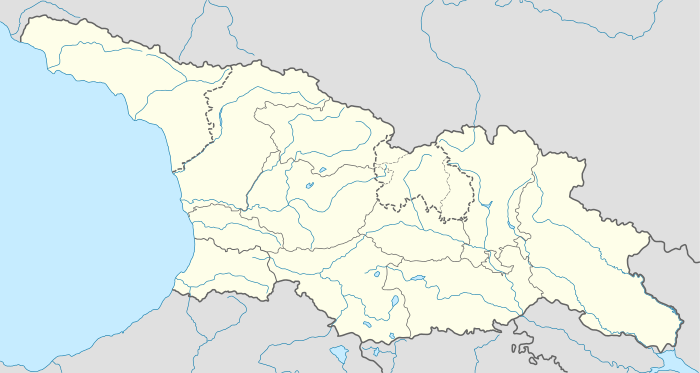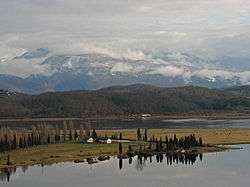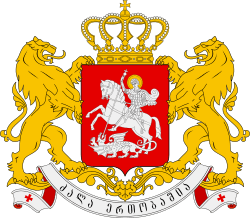Pitsunda
| Pitsunda ბიჭვინთა (Georgian) Пиҵунда (Abkhaz) Bichvinta | |
|---|---|
|
The view of Caucasus mountains from Pitsunda cape. | |
 Location of Pitsunda | |
 Pitsunda Location of Pitsunda | |
| Coordinates: GE 43°10′N 40°20′E / 43.167°N 40.333°ECoordinates: GE 43°10′N 40°20′E / 43.167°N 40.333°E | |
| Country | Georgia (Abkhazia[note 1]) |
| Government | |
| • Mayor | Chingis Bigvava[1] |
| • Deputy Mayor | Beslan Smyr[2] |
| Climate | Cfa |
| Website | http://www.pitsunda-ab.ru/ |
Pitsunda or Bichvinta[3] (Georgian: ბიჭვინთა [bitʃʼvintʰɑ]; Abkhaz: Пиҵунда; Russian: Пицунда) is a resort town in Gagra district of Abkhazia.[note 1]
History
The town was founded in the 5th century BC as Pityus (Ancient Greek: Pityus, Πιτυοῦς, genitive Pityuntos, Πιτυοῦντος) or Pitiunt, a Greek colony and trade port on the coast of the Kingdom of Lazica.[4] The city was surrounded by a defensive wall, the castellum had a second line of defence built in mid-3rd century AD.[5] Excavations guided by Andria Apakidze unearthed remains of three 4th-century churches and a bath with superb mosaic floors. The former "Great Pityus" harbour is now a mere lake within the town.
The Goths[6] attacked the city in 255 CE after taking the Bosporan fleet. The Roman garrison under the command of Successianus repelled the attack, however they returned in the next year, took the city and proceeded further to sack Trebizond.[7]
Saint John Chrysostom was being led towards Pityus by the imperial soldiers, in execution of the decree of exile, when he died on the way in 407.[4] Like Dioskurias, it remained under Roman control within the Georgian kingdom of Colchis until the 7th century. The city passed under Abasgian control and became one of the major political and religious centres of the kingdom of Egrisi (Lazica). An archbishopric of Pitiunt was instituted in 541. In medieval Georgia, the town's name was spelled as Bichvinta. At the end of the 10th century, King Bagrat III of Georgia built there the Pitsunda Cathedral which survives to this day and contains vestiges of wall-painting from the 13th and the 16th centuries. Bichvinta also served as the seat of the Georgian Orthodox Catholicate of Abkhazia until the late 16th century when Abkhazia came under the Ottoman hegemony within Georgia. In his 1911 article for the Catholic Encyclopedia, Sophrone Pétridès described Pityus as a titular see,[4] but it is not now found in the Catholic Church's list of such sees.[8] In the late 13th century, the area housed a short-lived Genoese trade colony called Pezonda.
Pitsunda was the favourite resort of First Secretary of the Communist Party of the Soviet Union Nikita Khrushchev. In October 1964 he happened to be vacationing in Pitsunda when he was deposed from power. Khrushchev once proposed a major dam and hydroelectric power scheme on the Bzyb River near Pitsunda, but his experts informed him that a dam built on the Bzyb River would have had catastrophic effects in causing beach erosion at Pitsunda. In the end, the dam was built on the Inguri River instead, where the impact upon the coastline was assessed to be considerably less pronounced.[9]
Administration
Town status
On 7 February 2007, after many appeals by inhabitants, the People's Assembly of Abkhazia resolved to give Pitsunda town-status. Parliamentarians expressed the hope that the decision would help Pitsunda develop as a resort.[10][11] Since becoming a town, the Mayor of Pitsunda is no longer appointed by the Governor of Gagra District but instead directly by the President of Abkhazia. On 29 January 2016, Pitsunda's town-status was formally enshrined in Abkhazia's constitution.[12][11]
2011 Assembly elections
In the 2011 assembly elections, Mayor Beslan Ardzinba and six other incumbent deputies of the Assembly stood for re-election. The winning candidates were Beslan Ardzinba, Badra Avidzba, Olga Grigorenko, Chengiz Bigvava, Georgi Zardania, Gennadi Cherkezia, Gennadi Mikanba, Damia Kokoskeria and Inessa Dzkuia.[13] On 14 February, during the first session of the new convocation, Damir Kokoskeria was elected Chairman of the Assembly over Gennadi Cherkezia, by a one vote difference.[14]
Since 2014
Following the May 2014 Revolution and the election of Raul Khajimba as President, on 28 October 2014 he replaced Ardzinba as Mayor with Chingis Bigvava.[1]
List of Mayors
| Heads of the Administration of the Urban-type Settlement Pitsunda: | |||||||
| # | Name | Entered office | Left office | Governor of Gagra District | Comments | ||
| Chingiz Bigvava | ≤ June 2000 | Grigori Enik | |||||
| Jon Dbar | ≥ January 2006 | Valeri Bganba | |||||
| Beslan Ardzinba | October 2006 | [15] | 8 February 2007 | Astamur Ketsba | |||
| Heads of the Administration of the Town Pitsunda: | |||||||
| # | Name | Entered office | Left office | President | Comments | ||
| 1 | Beslan Ardzinba | 8 February 2007 | 29 May 2011 | Sergei Bagapsh | |||
| 29 May 2011 | 1 June 2014 | Alexander Ankvab | |||||
| 1 June 2014 | 28 October 2014 | [1] | Valeri Bganba | ||||
| 2 | Chingis Bigvava | 28 October 2014 | [1] | Present | Raul Khajimba | ||
Gallery
 Pine grove
Pine grove
Notes
- 1 2 Abkhazia's status is disputed. It considers itself to be an independent state, but this is recognised by only a few other countries. The Georgian government and most of the world's other states consider Abkhazia de jure a part of Georgia's territory. In Georgia's official subdivision it is an autonomous republic, whose government sits in exile in Tbilisi.
References
| Wikimedia Commons has media related to Pitsunda. |
- 1 2 3 4 "У К А З "О главе администрации города Пицунда"". Apsnypress. 28 October 2014. Retrieved 29 October 2014.
- ↑ "Администрация городов, сёл и посёлков Гагрского района". Gagra District Administration. Retrieved 28 May 2012.
- ↑ Numerous sources in the discussion
- 1 2 3
 Herbermann, Charles, ed. (1913). "Pityus". Catholic Encyclopedia. New York: Robert Appleton Company.
Herbermann, Charles, ed. (1913). "Pityus". Catholic Encyclopedia. New York: Robert Appleton Company. - ↑ Kacharava, D. D. (1983–1984). "Archaeological Investigations on the Eastern Black Sea Littoral, 1970-80". Archaeological Reports. The Society for the Promotion of Hellenic Studies. 30: 99. doi:10.2307/581033. JSTOR 581033.
- ↑ Called Scythae and Borani in comtemporary sources
- ↑ Wolfram, Herwig; Dunlap, Thomas J. (1990). History of the Goths. University of California Press. p. 49. ISBN 978-0-520-06983-1.
- ↑ Annuario Pontificio 2013 (Libreria Editrice Vaticana, 2013, ISBN 978-88-209-9070-1), p. 953
- ↑ Blatter, Joachim; Ingram, Helen M. (2001). Reflections on water: new approaches to transboundary conflicts and cooperation. MIT Press. pp. 221–2. ISBN 0-262-02487-X.
- ↑ "Курорт Пицунда стал городом". Администрация Президента Республики Абхазия. 8 February 2007. Retrieved 27 January 2012.
- 1 2 "В ПЕРВОМ ЧТЕНИИ ПРИНЯТА ПОПРАВКА К КОНСТИТУЦИИ КАСАЮЩАЯСЯ МЕСТНОГО САМОУПРАВЛЕНИЯ И УПРАВЛЕНИЯ В АБХАЗИИ". Abkhazia Inform. 4 November 2015. Retrieved 13 March 2016.
- ↑ "ГЛАВЫ АДМИНИСТРАЦИЙ ГОРОДОВ И РАЙОНОВ БУДУТ НАЗНАЧАТЬСЯ ПРЕЗИДЕНТОМ ПО СОГЛАСОВАНИЮ С СОБРАНИЕМ СООТВЕТСТВУЮЩЕЙ АДМИНИСТРАТИВНО-ТЕРРИТОРИАЛЬНОЙ ЕДИНИЦЫ". Abkhazia Inform. 29 January 2016. Retrieved 13 March 2016.
- ↑ "Подведены итоги выборов в так называемое народное собрание г.Пицунда". City Administration of Pitsunda. 17 February 2011. Retrieved 5 April 2012.
- ↑ "В Администрации города Пицунды прошло первое заседание так называемого Народного собрания". City Administration of Pitsunda. 18 February 2011. Retrieved 5 April 2012.
- ↑ "так называемый Глава Администрации г.Пицунда". The official website of the City Administration of Pitsunda. Retrieved 27 January 2012.



